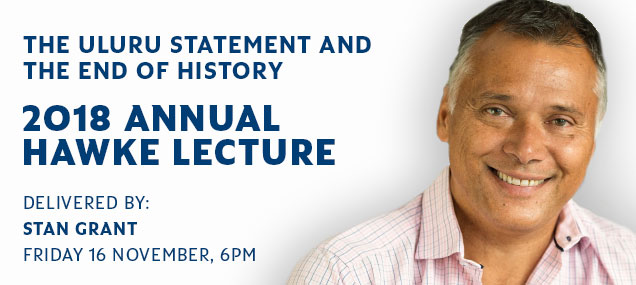21st Annual Hawke Lecture
Hall C, East Building, Adelaide Convention Centre
Access Video HERE
Join us for the 21st Annual Hawke Lecture to be delivered by award winning Australian journalist and writer Stan Grant.
In 1989 political scientist Frank Fukuyama declared the end of history. The Berlin Wall was about to come down, the communist iron curtain was being lifted. The great ideological battle of the 20th century, the Cold War between the United States and the Soviet Union was over. Fukuyama said only one ideology stood triumphant: western liberal democracy. This was humanity’s high point, the culmination of the struggle for freedom.
Thirty years later history is back. The world is riven with resurgent nationalism, tribalism, sectarianism. We are living through what has been called a democratic recession, faith is waning in the institutions of democracy, the political strongman is ascendant. In Australia a third of voters have turned away from the two major parties and are being lured to the fringes.
In the midst of this Indigenous people have presented a gift to the nation: the Uluru Statement from the Heart. It represents the culmination of consultations across the country and calls for indigenous people to be recognised and given a voice in our nation’s founding document, the Constitution. At a time when democracy is in retreat a people for whom democracy was never designed, who were locked out of the nation, were now making a profound commitment to it.
In his Annual Hawke Lecture, journalist and Wiradjuri man Stan Grant argues that the Uluru Statement represents a chance to tell Australia’s story anew, to tell the truth of a nation that has its roots tens of thousands of years before the landing of the First Fleet. He says the rejection of the Uluru Statement is a moment lost, a moment that could have completed Australian liberalism. It was a call for a final peace, to put to rest the stain on our soul and build an Australia for all. He says it is a moment lost but a dream still alive.
stan grant
Stan Grant is an award winning Australian journalist and writer whose career has taken him around the globe. He has reported on the great stories of our time from war and conflict to national disaster and the birth of new nations. He draws ancestry from the Wiradjuri and Kamilaroi people and an Irish convict banished from his homeland and transported to the colony of New South Wales, where he left an enduring legacy: a family both white and black.
Stan writes about the enduring themes of history, race and identity and his abiding faith in the idea of liberalism. He is the author of the books “Tears of Strangers” and “Talking to My Country” as well as the Quarterly Essay “The Australian Dream: Blood, History and Belonging”. His work has appeared in many journals, magazines and Australia’s leading newspapers. His forthcoming book “Australia Day: The Memory of Wounds” will be published in 2019 by Harper Collins. He is currently Chief Asia Correspondent for ABC and host of the current affairs program “Matter of Fact”.
UniSA reconciliation action plan
At its core, the Stretch Reconciliation Action Plan (RAP) is student-centric. Supporting Aboriginal students to achieve success which is centred on providing a culturally safe and appropriate environment, one in which students can see tangible evidence of the University’s commitment to a two-way relationship with Aboriginal People. The breadth of deliverables, from advancing student outcomes, building cultural awareness amongst staff and students, and enhancing Aboriginal research and its impact, speak to the whole of university approach that is fundamental to providing a culturally safe space in which our students can succeed.
UniSA is committed to strengthening our position as the University of Choice for Aboriginal People by creating an environment where both Aboriginal and non-Aboriginal people can learn, teach, research and engage with each other in a place that acknowledges, respects and learns from Aboriginal People and their unique knowledges. We understand that this requires an authentic two-way approach to engagement and relationships with Aboriginal People and organisations.
![]()
Presented by The Bob Hawke Prime Ministerial Centre
While the views presented by speakers within the Hawke Centre public program are their own and are not necessarily those of either the University of South Australia or The Hawke Centre, they are presented in the interest of open debate and discussion in the community and reflect our themes of: strengthening our democracy - valuing our diversity - and building our future.
The copying and reproduction of any transcripts within the Hawke Centre public program is strictly forbidden without prior arrangements.
While the views presented by speakers within The Bob Hawke Prime Ministerial Centre public program are their own and are not necessarily those of either the University of South Australia, or The Bob Hawke Prime Ministerial Centre, they are presented in the interest of open debate and discussion in the community and reflect our themes of: Strengthening our Democracy - Valuing our Diversity - Building our Future. The Hawke Centre reserves the right to change their program at any time without notice.



